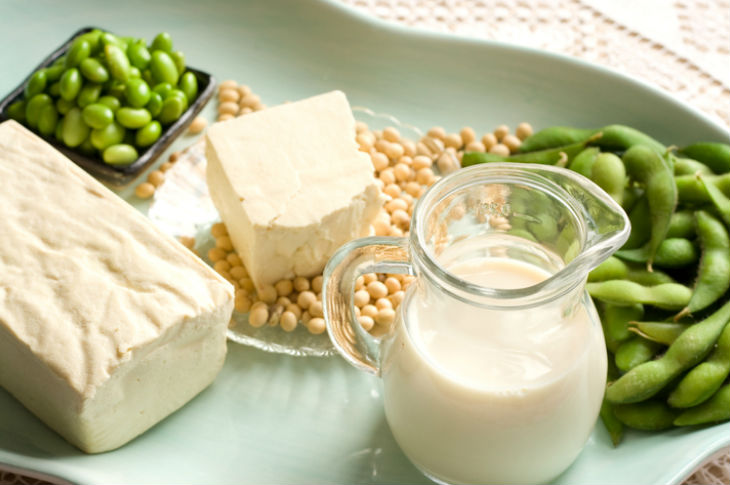
Soy is having an identity crisis. For years, we’ve heard it can lower cholesterol and improve heart health. But now, foods that claim to be soy-free are popping up everywhere. If you’re wondering what gives, here’s what you need to know.
You’re unlikely to be allergic to it. Lately, lots of people are steering clear of soy for fear of food allergies. No one would argue that having a soy allergy is serious business, but it rarely strikes adults. In fact, soy allergy only affects 0.4 percent of children, most of whom will outgrow it by age 10. So while some people really do need to avoid soy, the numbers are way less scary than they may seem.
It’s jammed with nutrition. This bean is loaded with high quality protein (20 grams per cup of shelled edamame, to be exact). In fact, it’s one of the few plant foods that provide complete protein, meaning it delivers all the essential amino acids your body needs to synthesize its own protein supply. At the same time, it’s packed with fiber for healthy digestion. For example, one cup of shelled edamame delivers 12 grams’ worth. That’s as much as you’d net from three servings of oatmeal. In addition, it’s rich in blood pressure-lowering potassium and magnesium, a mineral that helps our bodies use insulin more efficiently.
It doesn’t cause breast cancer. Soy is naturally rich in isoflavones, substances that structurally resemble estrogen. Why might that be problematic?
“Some people are still wary of very old animal research suggesting that isoflavones can increase estrogen levels, raising the risk of breast cancer,” says Karen Collins, MS, RDN, a nutrition advisor for the American Institute for Cancer Research. “But the way isoflavones are metabolized in animals is very different than in humans, plus the doses used are so far beyond what is possible with human consumption that it’s a crazy comparison.”
Today, the thinking on soy and breast cancer has practically done a 180. So much so that the American Cancer Society says the benefits of eating soy outweigh any potential risks.
It’s safe for guys too. What about the supposed estrogen-like impact of soy for men? “The idea that isoflavones turn into estrogen in the body is based on fear and misunderstanding,” says Collins. “There’s an extensive body of research that finds no decrease in testosterone, no increase in circulating estrogen, and no changes in sperm among men who consume soy.” And when it comes to prostate cancer, several studies suggest it may even be protective.
It’s really good for your heart. Unlike animal protein, such as meat, eggs, and dairy, soy is low in saturated fat and contains zero cholesterol. As it turns out, it may even help people with high cholesterol trim unhealthy LDL cholesterol by 4.2 to 6.7 mg/dL. But that’s not as easy as tossing the occasional soy-based protein bar in your gym bag. To really reap soy’s cholesterol-lowering powers, you’ll have to eat 25 grams of soy protein a day, which is the equivalent of 3 ounces of tofu, 1 soy burger, and a half-cup of edamame.
The type you choose matters. “Soy doesn’t suddenly turn an otherwise unhealthy food into a healthy one,” says Collins. “If a food is high in sugar, fat, and calories, soy isn’t going to undo its harmful effects.” Truth is, soy only improves heart health when it replaces other less healthy proteins as part of a diet that’s low in saturated fat and cholesterol. So think of soy as a substitute for animal products, instead of an addition to your diet.
Need ideas? Swap in soy milk for cow’s milk, spread soy butter on whole-wheat toast, sear a tofu teriyaki steak, or toss tempeh into tacos. Your heart will thank you.
The post The Truth About Soy appeared first on Fitbit Blog.
source https://blog.fitbit.com/truth-about-soy/
No comments:
Post a Comment